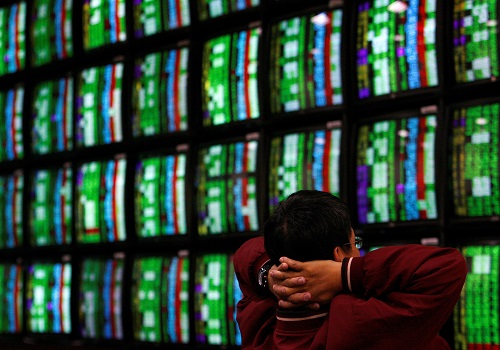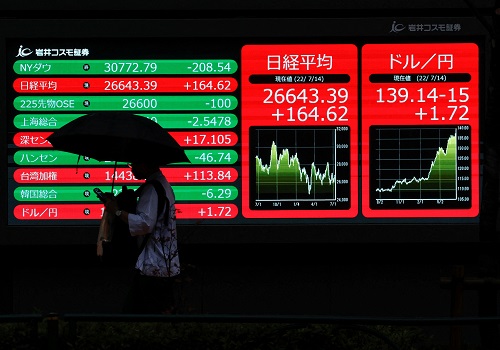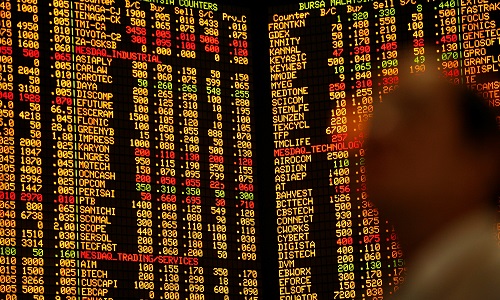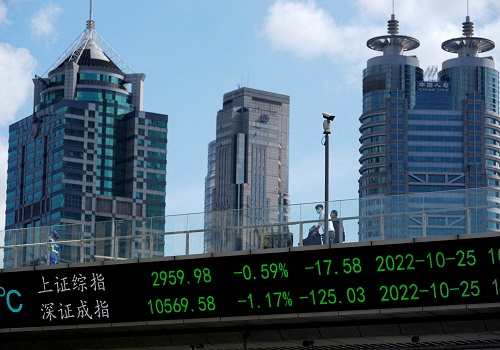World stocks rally, dollar dips as investors weigh spending data, inflation scares
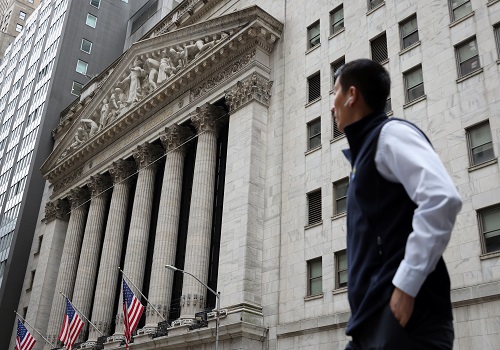
Follow us Now on Telegram ! Get daily 10 - 12 important updates on Business, Finance and Investment. Join our Telegram Channel
Global equities climbed on Friday, while the dollar dipped and oil rose as investors reduced their expectations of an aggressive interest rate hike by the Federal Reserve this month and as U.S. spending data beat forecasts.
Investors still face concerns that the world economy is headed for recession as central banks rush to get on top of galloping inflation, with steep interest rate rises seen this week in Canada, New Zealand, Chile, South Korea and the Philippines. Many are also still digesting an easing of Italy's political crisis.
Fears of an economic downturn were fanned on Friday by Chinese data showing annualized 0.4% growth in the second quarter, the worst since at least 1992, excluding early 2020 when the COVID pandemic erupted.
The data reflect the colossal hit from widespread COVID lockdowns. It sent Chinese shares 1.7% lower and dragged an Asian ex-Japan index to two-year lows.
Investors elsewhere looked on the bright side.
"The market is due for a short-term snapback and because we got better-than-expected results from Citigroup and retail sales that gave fundamental reasons for investors to be optimistic," said Sam Stovall, chief investment strategist at CFRA.
Rohan Khanna, a strategist at UBS, pointed to Thursday's comments by Fed Governor Christopher Waller and St. Louis Fed President James Bullard favoring a 75 basis-point rate hike in July, rather than the 100 bps that some had been expecting, as good for Friday's trading. Both Bullard and Waller are considered policy hawks.
Meanwhile, Italy's president rejected Prime Minister Mario Draghi's resignation, heading off an immediate collapse of the government though the fate of the coalition remains in balance.
The pan-European STOXX 600 index rose 1.79% and MSCI's gauge of stocks across the globe gained 1.46%. Wall Street's main indexes traded higher as upbeat retail sales data allayed concerns about an economic slowdown, while shares of Citigroup surged after quarterly results.
Traders may be pressured overall, however, by companies' second-quarter earnings, which so far have mostly underwhelmed.
Several European firms posted downbeat results on Friday, while U.S. bank Wells Fargo reported a profits fall, with more money set aside to cover bad loans.
JPMorgan Chase and Morgan Stanley on Thursday reported relatively weak results.
The Dow Jones Industrial Average rose 1.85% while the S&P 500 gained 1.61%, to 3,851.41, and the Nasdaq Composite added 1.41%.
(Graphic: US fed funds and inflation: https://fingfx.thomsonreuters.com/gfx/mkt/lbvgnxqebpq/U.S.%20fed%20funds%20and%20inflation.PNG)
RECESSIONARY SET-UP
Weakening growth has forced markets to tone down rate hike expectations. With Europe facing an energy supply crunch, traders have dialed back bets on European Central Bank policy tightening by year-end.
U.S. markets are penciling in rate cuts after March 2023.
"We moved rapidly from a stagflationary set-up to more of a recession-dominated one, and very strong inflation is adding to fears that the Fed will need to do more front-loaded tightening," said Salman Ahmed, global head of macro at Fidelity International.
Treasury yields slipped two-three basis points across the curve while two-year yields held firmly above the 10-year segment, the curve inversion that often presages recession.
The yield on 10-year Treasury notes was down 3.1 basis points to 2.928%. The two-year U.S. Treasury yield, which typically moves in step with interest rate expectations, was down 1.3 basis points at 3.133%.
In Europe, German 10-year yields fell 11 bps to 1.071%, the lowest since May 31. Italy's borrowing costs slipped after Thursday's 20 bps jump though its yield premium over Germany stayed near one-month highs.
The Fed officials' comments knocked the dollar index off two-decade highs.
The dollar index fell 0.451%, with the euro up 0.59% to $1.0075. The single currency has slid more than 1% this week, having hit parity against the greenback for the first time in 20 years.
The yen firmed 0.2% to 138.8, retreating from lows of almost 140 per dollar, levels last hit in 1998.
The growth worries weighed on commodities, with copper prices set for their worst weekly loss in more than two years and U.S. crude recently rose 1.79% to $97.49 per barrel while Brent was at $101.05, up 1.97% on the day.












 320-x-100_uti_gold.jpg" alt="Advertisement">
320-x-100_uti_gold.jpg" alt="Advertisement">









